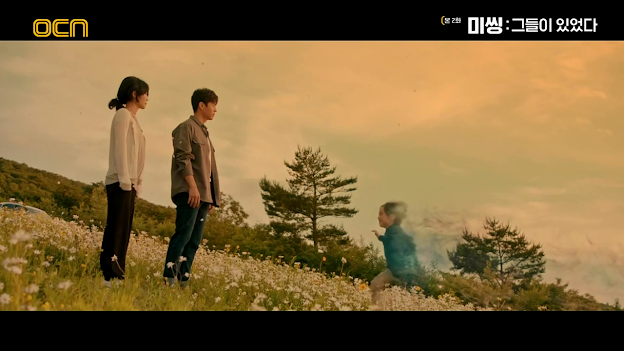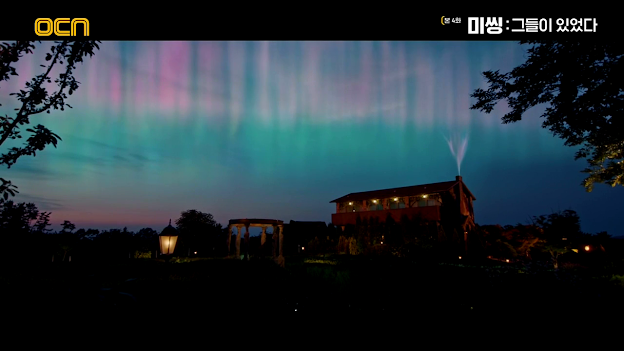And then we meet Kim Wuk, a conman, who one time conned the very wrong man. In a frantic escape from the grabby hands (and their eager baseball bats) he lands in a quiet, unreal, almost otherworldly odd Duon Village. There he meets Jang Panseok, an older man who quickly explains where he actually is - in a village where dead people gather in wait for their bodies being discovered and properly buried. And the fact it's a whole village, makes a chilling realization how many people just disappear without any trace and no one can find them, and their bones just turn to dust under the tree roots. Panseok helps the people to move on, that is - he helps to find their bodies. He's driven by a personal tragedy - looking for his missing daughter.
And then we have a butterfly. A white butterfly appearing from the place the body was buried. Which reminds me of a very sad but beautiful Korean etiological myth about the butterflies. I always tell it to my students so why not here? Once upon a time there was a young maiden who was about to get married to a young and kind man, however they never met. And a day (some versions say it was exactly this day) before their wedding, the young man died. The young girl, accompanied by her servant, came to the tomb every day, pleading with her dearly departed to take her with him. And one day, her grief was answered, as the tumulus cracked open and before the girl an earthly abyss was beckoning. Without hesitation, she jumped into it and the servant girl only managed to grab her white skirt just before the earth shut behind her. The remnants of the dress turned in the hands of the girl into the white butterflies. That is why there is a deep parallel between this myth and little butterfly shaped pins that mourning women have in their hair.
Anyway, Kim Wuk, coming into the village, after the initial reluctance and quite understandable denial, starts to feel the need to help the inhabitants of the place. Especially that he himself witnessed the kidnapping of a young woman, who later arrived through the cafe into the place, but refuses to accept she's dead and her soon-to-be-husband can't see her and can't help her. And her fiancé is a detective, who step by step discovers that Choi Yeona's disappearance might be an element of some bigger scheme, as she's connected with two other people who turned up dead. Shin Junho turns to Kim Wuk for help, uneasy if he could help him or not. The latter tries not to get too involved with the police, however he tries to solve it with his abilities and his friends.
It's hard for the newcomers to accept they are dead. They can conjure up their surroundings from the memories, that's why Yeona could fill up the empty room that looked exactly like her own in the living world. And when they disappear, their surroundings disappear along with them. The whole world is woven with gossamer, no matter how real it seams.
And yet, even in this purgatory world there are people who bring all of their ugliness and dark urges from the time they were alive. Instead of making a place for himself to wait, Ilseok, a horrible man, prefers to carve up the villagers, but his paranoia regarding Wuk's immunity to his blade and cuts starts to sip into the people around. A sexual offender, rapist and a killer while he was alive, spends his days enflamed by anger and desire to leave the place. And after he attacked few people, everyone wants him to be gone, but them the rules - a body needs to be found.
Both Panseok and Park Youngho, who was a detective while alive, patrol the village for everyone's safety. And during the talk, Panseok says one sentence that completely threw me off the balance. He says that they need to find and catch Ilseok because he's dangerous to the villagers, "most of whom are women". And this one short utterance, said almost in a passing says more about the state of the world than a in-depth drama. In the village of the dead, the majority is made of women. Which means many things, actually. Women are the majority of the victims whose bodies are never found. Let that sink in. Which may mean they are killed by relatives, by spouses, by families, co-workers, literally anyone, and dumped someplace for never being recovered. Which may also mean that the search for women's bodies is not as thorough as for the men's.
There are also people living on the fringes of society, or even completely outside of it, forgotten and never seen, even in death. They linger, alone and unheard, unable to move on. They were invisible when alive, so the world has not noticed their death as well. And that is somewhat a frightening thought - to be so much insignificant.
Despite Wuk's antics and the occasional humor, the series is anything but humorous or light. Even Wuk himself, always stating that his name is actually written as "brightness", bringing happiness to people, plays a role of a hierophant. He's one of two people alive in the village of the dead. And little by little, the village starts to shed its secrets.
Like the woman really hostile to Wuk, who turns out to be his mother? What a way to discover that the mother who left you when you were just a kid is dead. In remaining 8 episodes we will probably get to the core of the village's purpose and maybe we will get the answer on how Panseok and Wuk can see the dead. Were they on the death threshold themselves, so after becoming dead-adjacent, they can see the other side? Who is Thomas Cha, someone who is clearly here the longest? Will Wuk replace Panseok as a traversing character from the myths?
In short - I really, really love this one so far.












